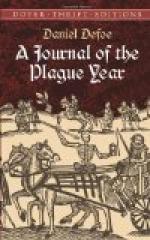I had, indeed, been in some passion at first with them—though it was really raised, not by any affront they had offered me personally, but by the horror their blaspheming tongues filled me with. However, I was doubtful in my thoughts whether the resentment I retained was not all upon my own private account, for they had given me a great deal of ill language too—I mean personally; but after some pause, and having a weight of grief upon my mind, I retired myself as soon as I came home, for I slept not that night; and giving God most humble thanks for my preservation in the eminent danger I had been in, I set my mind seriously and with the utmost earnestness to pray for those desperate wretches, that God would pardon them, open their eyes, and effectually humble them.
By this I not only did my duty, namely, to pray for those who despitefully used me, but I fully tried my own heart, to my fun satisfaction, that it was not filled with any spirit of resentment as they had offended me in particular; and I humbly recommend the method to all those that would know, or be certain, how to distinguish between their zeal for the honour of God and the effects of their private passions and resentment.
But I must go back here to the particular incidents which occur to my thoughts of the time of the visitation, and particularly to the time of their shutting up houses in the first part of their sickness; for before the sickness was come to its height people had more room to make their observations than they had afterward; but when it was in the extremity there was no such thing as communication with one another, as before.
During the shutting up of houses, as I have said, some violence was offered to the watchmen. As to soldiers, there were none to be found. The few guards which the king then had, which were nothing like the number entertained since, were dispersed, either at Oxford with the Court, or in quarters in the remoter parts of the country, small detachments excepted, who did duty at the Tower and at Whitehall, and these but very few. Neither am I positive that there was any other guard at the Tower than the warders, as they called them, who stand at the gate with gowns and caps, the same as the yeomen of the guard, except the ordinary gunners, who were twenty-four, and the officers appointed to look after the magazine, who were called armourers. As to trained bands, there was no possibility of raising any; neither, if the Lieutenancy, either of London or Middlesex, had ordered the drums to beat for the militia, would any of the companies, I believe, have drawn together, whatever risk they had run.
This made the watchmen be the less regarded, and perhaps occasioned the greater violence to be used against them. I mention it on this score to observe that the setting watchmen thus to keep the people in was, first of all, not effectual, but that the people broke out, whether by force or by stratagem, even almost as often as they pleased; and, second, that those that did thus break out were generally people infected who, in their desperation, running about from one place to another, valued not whom they injured: and which perhaps, as I have said, might give birth to report that it was natural to the infected people to desire to infect others, which report was really false.




